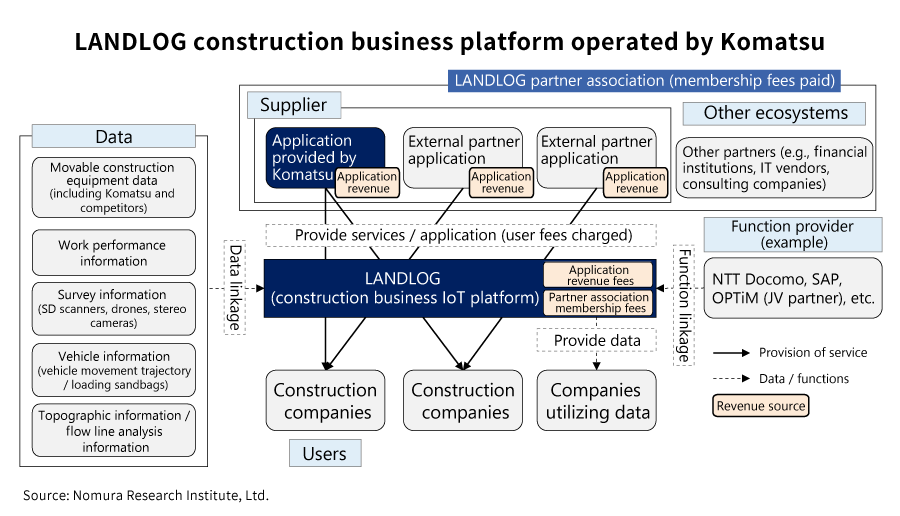In Pursuit of a World-Class Japanese-Style Platform Business -- Two Platform Strategies
#DX
May 12, 2020
Overseas platformers have been expanding their presence worldwide. They have created a cycle for enhancing businesses by retaining contacts with customers and utilizing the data acquired from them. Given the circumstances, some hold the view that Japanese companies have no shot at winning, but in reality there are many undeveloped sectors, and a platform strategies that leverage technology, quality, and other strengths are possible, points out Masahito Komiya of NRI. We talked to Mr. Komiya, who is an expert on digitalization and platform strategies.
Providing ecosystem-wide services
--- Mr. Komiya, how do you define a platform?
In our book Japanese Platform Business (Nihongata Platform Bijinesu), what we call a “platformer” is “a company that not only provides services to customers by itself, but also networks other players such as suppliers and provides ecosystem-wide services to users”.
One example is Uber, a ride-sharing platform. Traditionally, transportation service companies had their own vehicles to provide driving services, but Uber developed a business that networks transportation service providers such as taxis and individual drivers, and then matches them with users, without Uber owning the vehicles themselves. By doing so, it is possible to scale up efficiently without making large capital investments.
Platformers retain customer contacts and utilize the data acquired from them to enhance services, enhance the attractiveness of the platforms they operate, and bring in more customers and data. By bringing operations into a cycle of competitive enhancement like this, they can prevent competitors from entering the market, and can secure a competitive advantage.
“Segmented platform strategy” that threads the gaps
--- Why do few Japanese companies have a global presence in terms of platforms?
What I feel when consulting is that many companies think that they cannot compete with mega platformers like GAFA (Google, Apple, Facebook, Amazon) and BATH (Baidu, Alibaba, Tencent, Huawei), and that the hurdles to holding IT technology and operating a platform are too high. However, a platform is not necessarily a threat, and companies do not have to build their own platforms. You need to understand how to develop your company’s business while effectively utilizing platforms.
--- How can you actually utilize platforms?
There are two approaches. The first is the “segmented platform strategy”. As mega-platformers aim to expand their business globally and efficiently, they have not been able to provide outstanding know-how and solutions for specific issues in niche areas. By threading that gap, you can develop a platform that leverages your company’s strengths by specializing in specific segments such as industry, region, target customers, and processes.
One example is Komatsu's open IoT platform “Landlog”. While AWS (Amazon Web Services) and others provide IoT cloud platforms that connect various things to the Internet for all kinds of industries, Landlog specializes in the construction industry. It builds models that accumulate all kinds of construction-related data, like data on the construction equipment of your company as well as others, site data measured using drones etc., and worker data etc., and also involves other IT application vendors, to provide construction-related solutions.

“Collaboration strategy” with other companies’ platforms based on your company’s strengths
--- What should companies do if they cannot deploy a platform on their own?
As a second approach, it is possible to create a “collaboration strategy” that maximizes the use of other companies' platforms while leveraging your own company’s strengths. You build win-win relationships by providing know-how that platformers do not have. For example, a mid-sized construction company in Fukushima called Kageyama Construction has developed an application that enables monitoring by visualizing construction sites using image data. Utilizing Komatsu's “Landlog”, Kageyama is expanding this app not only locally but also nationwide, and is working on further application development with its partners.
Some companies are already drawing on the power of platforms to expand globally. LIGHTz, which provides information services for the manufacturing industry, uses AI (artificial intelligence) to visualize the tacit knowledge and know-how of mold craftsmen, and has created a mold quality control application that cannot be imitated by other companies. It is deploying this globally through the Siemens (Germany) IoT platform “Mindsphere” and establishing its own position.
--- Please offer some advice for when considering strategies like this.
Japanese companies tend to focus on a platform’s form and digital technology, but that is not the essence of what a platform is. The most important thing is to delve deeper into what challenges your customers are facing and what value your company can offer. You need to think about how to distinguish your company's know-how and the value it provides, and how to utilize the ecosystem to multiply it by N. On top of that, management needs to commit to achieving this and the IT and business departments need to work as a cross-departmental team.
Platform businesses combine multiple cutting-edge IT technologies, but there are many external players who can provide them, and the costs are also falling. Komatsu's Landlog and other projects are also making great use of the power of other companies in terms of platform functions and the like. For companies that are facing hurdles, particularly in terms of technology, we here at NRI hope to support companies by leveraging the abundant knowledge we have cultivated in the past and our comprehensive abilities in carrying out system development and operations, from strategy formulation to IT implementation.








